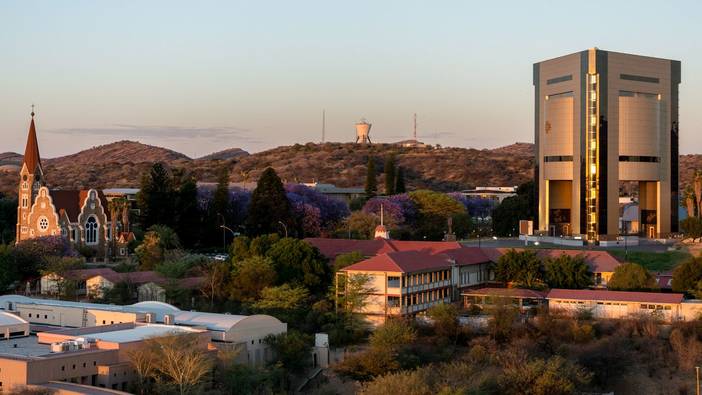![Protest against the agreement between Namibia and Germany on 28 May 2021 in Berlin [Translate to en:] Kundgebung gegen das Abkommen am 28.5.21 in Berlin](/fileadmin/_processed_/1/8/csm_Plakat_Kundgebung_280521_cc_Heike_Becker_d711c7ce18.jpg)
“Germany recognizes genocide”, the German media reported towards the end of May 2021. The genocide of the Herero and Nama took place in the former colony of German South-West Africa, now Namibia, between 1904–1908. The systematic killing by the extermination order of General von Trotha, neglect, and forced labour in concentration camps led to the first genocide of the 20th century.
Andreas Bohne has been active in the “Völkermord verjährt nicht! | No Amnesty on Genocide!” coalition for many years. The views expressed in this text are those of the author and do not necessarily reflect the opinion of the coalition or the position of the Rosa-Luxemburg-Stiftung.
Now, after more than five years of secret negotiations between the German and Namibian governments, they claim to be on the home straight. The agreement has already been initialled and will soon be signed by Foreign Minister Heiko Maas. Afterwards, it will likely be discussed in both parliaments, with Federal President Frank-Walter Steinmeier planning to officially ask for forgiveness in Namibia—according to the information made public so far.
While some descendants of the victims welcome the step as an important gesture, they are aware that this is only “second-rate recognition”. As emphasized by the German government in the press release of the German Foreign Office, these are “events [...] which were from today’s perspective: a genocide”. What is here overtly celebrated as a breakthrough is a statement similar to that made in 2004 by the Federal Minister for Economic Cooperation and Development, Heidemarie Wieczorek-Zeul, in which she asked for forgiveness. The only difference is that this time the statement cannot be dismissed as private opinion, as it represents an official government position.
Nevertheless, the German government is sticking to its existing goal to avoid any binding passages (e.g. on reparations) that would imply that the state takes full responsibility under international law. It is precisely this phrase—“from today’s perspective”—that has lead many representatives of affected communities to declare the agreement invalid and reject it outright.
The (Counter-)Narrative of Civil Society
In assessing the agreement, it is certainly pertinent to ask if no agreement is better than the existing one. Nevertheless, the fact that a text now exists at all is the result of decades of civil society engagement on the part of representatives of the genocide-affected communities in Namibia, Botswana and South Africa, of civil society in Germany, Black activists in the US, and scholars worldwide.
Although it may not be mentioned in many of the current reports, it should not be ignored that the struggle for the recognition of the genocide was and is a transnational solidarity movement. The movement has been characterized by the geographical distribution of the diverse actors involved, the networks formed, and the varied forms of action. Many years ago, the movement also sparked the debates that are today forcing political actors and society more broadly to reassess German colonial history—from colonial apologies ( “South-western romanticism” and denial of genocide), the restitution of human remains ( “Charité-Scandal 2011”) and cultural assets (“Witbooi Bible and whip”), to the current socio-economic situation in Namibia (unjust land distribution). All these examples clearly highlight the persistence and long-term effects of the genocide beyond the four terrible years.
Reference to the movement and the emphasis on civil society pressure is crucial, given the federal government’s appropriation of the rhetoric. Various announcements and opinions give the impression that the federal government initiated and drove this process of reconciliation and reappraisal—which it is now concluding. In practice, the opposite is true: actors from transnational civil society consistently pushed the federal government to act.
Transparency As an Empty Phrase, Exclusion as a Paradigm
An illustrative example: on 6 July 2015 the former Namibian Member of Parliament Ida Hoffmann, long-time activist Esther Muinjangue, and Paramount Chief Vekuii Rukoro were brusquely turned away at the gate of the Office of the Federal President when handing over a petition. Due to diplomatic pressure and an incipient media storm, the recognition of the genocide took place a few days later during a Federal Press Conference—one of the most important successes of the transnational movement.
The spokesperson for the Federal Foreign Office at the time, Martin Schäfer, stressed that the former Federal Foreign Minister Frank-Walter Steinmeier confirmed the validity of a joint motion by the Greens and the Social Democratic Party from 2012, according to which the atrocity was to be judged as a “war crime and genocide”. Since then, this assessment has constituted the official opinion of the German government.
Although the infamous phrase “from today's perspective” was not then used, the statement had shortcomings of its own. In this instance, the following phrasing was chosen: “the war of extermination in Namibia from 1904 to 1908 was a war crime and genocide”. In light of the fact that no Namibian state or nation existed at the time, this statement was rejected by many groups as erroneous, and exclusionary of the Herero and Nama communities.
Shortly after the Federal Press Conference, government negotiations were launched by two special envoys, Dr. Zed Ngavirue, and Ruprecht Polenz. It was here, at the latest, that one glaring contradiction became apparent: despite all the discussion of seeking reconciliation the talks were conducted in secret, lacking any transparency. Despite talk of inclusion, many groups of descendants were excluded from the process. Again and again, communities demanded inclusion and broad reflection. Esther Muinjangue, for example, repeatedly demanded the inclusion of Herero people from the Diaspora.
The federal government fell back on the convenient argument that government negotiations could only take place between governments and that the sovereign fate of the Namibian state could not be interfered with—referencing a lesson from the time of colonial rule. This may be true, but the German government never took the lead in ensuring the involvement of groups close to the government in Namibia, such as the Ovaherero/Ovambanderu Council for Dialogue on the 1904 Genocide. It would have been a compelling step for the federal government to have entered into dialogue with all the groups that had been excluded from the official negotiation process.
The German government's behaviour prevents true reconciliation from taking place. The government’s objective, described by Foreign Minister Heiko Maas as “finding a common path to genuine reconciliation in memory of the victims”, is being thwarted by its own actions. Groups such as the Ovaherero Traditional Authority and Nama Traditional Leaders Association protested against the agreement itself, shortly after its expected conclusion was made known. This makes it abundantly clear that the German government's selective behaviour stands in the way of “genuine reconciliation”.
As further details of the agreement become public, more criticism from traditional authorities has been forthcoming, including from those who were involved in the negotiation process. In the meantime, several Herero chiefs have officially rejected the agreement. Namibian opposition parties have also been joining the wave of criticism. The Landless Peoples Movement, among others, has been stressing that funds must be managed by the traditional authorities. The agreement is seen as bilateral and not one with the Herero and Nama.
Additionally, the former president of Botswana, Ian Khama, has demanded that the Herero in Botswana must also be included as beneficiaries of the reparations. All of which demonstrates that Germany has not been sufficiently sensitive when it comes to inclusion and transparency. The agreement has instead increased tensions on the Namibian side.
In view of the long-standing exclusion of various groups, it is more than a rhetorical faux pas for the reconciliation agreement to state that “the government and people of Namibia accept Germany's apology”. Not only does this formulation purport to speak for all groups, it also comes before any official request for an apology.
Only Cash Matters? No, But It Is Decisive!
The lack of transparency has repeatedly led to controversy and frustration. When a compensation sum of 10 million euro was floated a few months ago, the response was understandably one of outrage. At least now it should be finally clear to everyone involved that lack of transparency works diametrically against building trust, serving only to fuel speculation.
New figures became known several days after the announcement of the “reconciliation agreement”. The Namibian newspaper Namibian was the first to mention the sum of 1.1 billion euro. Large as this may sound, it pales considerably in light of the planned 30-year payment period and the fact that the sum is equivalent to the development aid paid since 1989. The sum is to flow into infrastructure development projects, land reform, vocational training, and similar projects in regions populated by groups particularly affected by the genocide. One statement made by Ruprecht Polenz is noteworthy in this context: in an interview with Deutschlandfunk, he mentioned that the payments would also depend on the “absorption capacity of Namibian society”. Does this mean that the funds would not be released if certain conditions were not met?
This is also in line with Germany’s existing course of action: sidestepping (individual) reparations—something which is not just a question of important words for many descendants, but rather an important (symbolic) measure—and moving toward special initiatives for cooperation on technical development. It is no accident that the press release of the Federal Foreign Office states: “this does not form the basis of legal claims for compensation”. State responsibility as an obligation under international law is being hereby rejected.
It is not yet clear how the projects will be decided on. Potential constellations involving a triumvirate of representatives from the Namibian and German governments and representatives of the affected communities are emerging. If extensive involvement and participation rights are not guaranteed, and the communities are not granted veto rights, then the process is likely to fail at this point—among other things according to the principle of “free, prior and informed consent”, as demanded by the European Centre for Constitutional and Human Rights (ECCHR).
It was never possible to speak of equal footing during the negotiations. Again, the question of funds illustrates that Germany dictates and Namibia reacts. The German government, for example, originally put the value of the project at around 300 million euro. In an interview with the Deutsche Welle, Zed Ngavirue emphasized that the final sum at hand would have been “financially and politically affordable” from the German point of view. It was therefore not surprising that as Namibian Vice-President Nangolo Mbumbaaccepted the pledge of the final sum—1.1 billion euro—he stated: “we are not proud of the amount”.
According to the draft agreement, 50 million euro would go towards the establishment of a foundation for reconciliation between the two states, including the promotion of cultural projects and youth exchange programmes. It would have been a good step to make significantly more funding available for the development of a culture of remembrance, of a science for coming to terms with the past, and of measures for reconciliation. Not only in Namibia, but also in Germany. Even if the money negotiated here rightly goes to Namibia, “reconciliation”—though statements from German politicians may make it seem this way—is not a one-way street and cannot be enforced in only one place. It is not in Namibia where colonial amnesia is to be found—characterized either by ignorance, conscious repression, or trivialization—but in Germany.
It is thus not surprising that the right-wing party “Alternative for Germany” (AfD) rejected the agreement and described it as part of “German apology culture”. When reports circulate in the media, as in the Namibian, that the German government did not want to offer more money in deference to the AfD, a disservice has been done to the agreement, serving only to help right-wing colonial apologists.
Agreements Should Only Be Seen as a Starting Point
It is good to acknowledge that a former colonial power has admitted to a historical injustice on a state-to-state level. Half-hearted phrases, exclusion of key groups, and conditions regarding the funds—these are only three of the contributing issues to the fact that reconciliation will only take place on paper. The agreement and “reconciliation” have only reached an imaginary home straight. If everyone is honest, what exists now is a basis for discussion on which to build—it should not be seen as the conclusion.
At least then, neither the process far nor the agreement will have been in vain.


